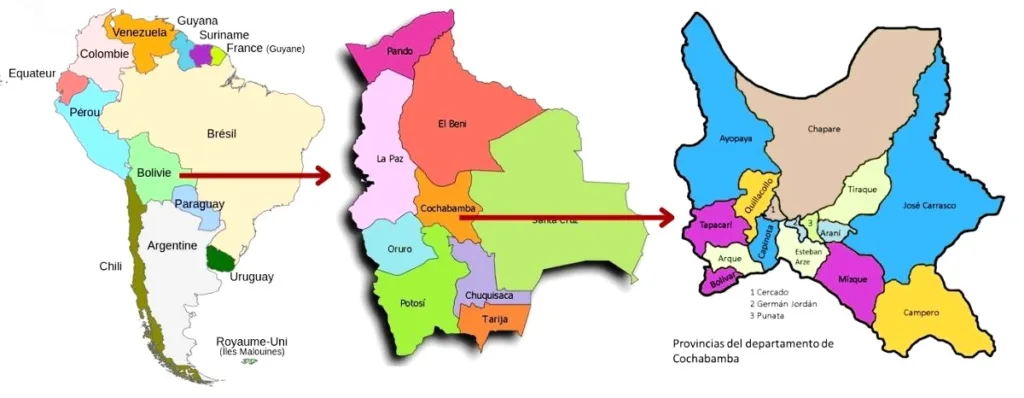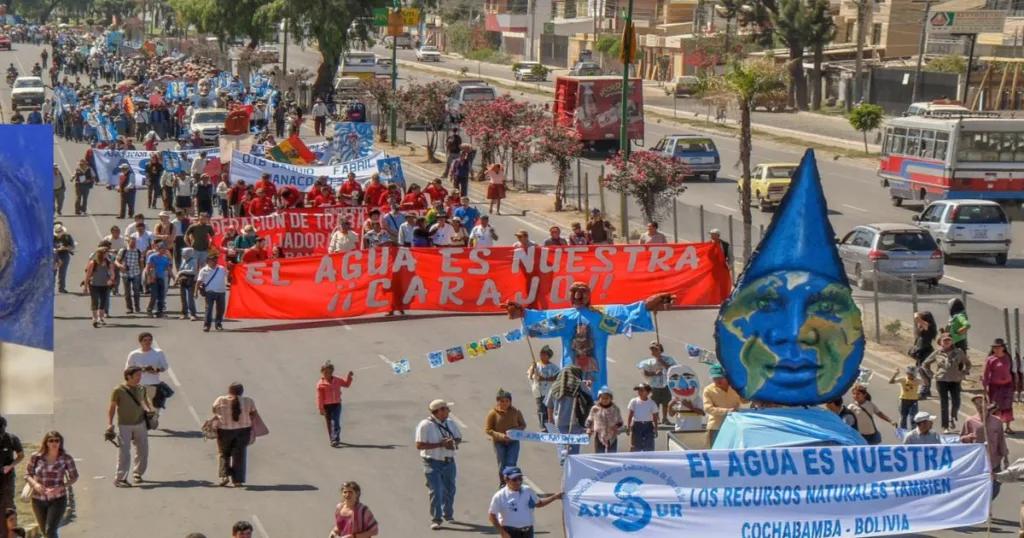Content
Bolivia and Water Privatization:
Companies usually sell the things they manufacture, right?
But, have you ever heard of a company trying to sell water? It’s not about those water cans delivered to your home. This is something entirely different. Imagine a company selling rainwater. Yes, it sounds strange, doesn’t it? But this actually happened in Bolivian history. What’s even more shocking is how they managed to make people pay for something as natural as rain.
The Prosperity and Struggles of Cochabamba

Cochabamba is a beautiful city in Bolivia. Its name means “land surrounded by lake,” and it was once known for its fertile lands and lush gardens. People even called it the “Garden City.” But despite its natural beauty and prosperity, Cochabamba became the center of a shocking struggle the Bolivian Water War.
Bolivia has always been rich in natural resources, and because of this, other countries, especially America, treated it like their playground. The result become a history filled with violence and bloodshed.
Even when Bolivia became a republic in 1982, living standards didn’t improve much. Former military rulers came to power but failed to bring any real change to the people. The country’s economy was in freefall, forcing Bolivia to borrow from the World Bank. This led to the privatization of public services, including water. The decision led to a major conflict in Cochabamba.
Privatization and the Water Crisis
In 1997-1998 when agriculture was booming in Cochabamba, the Semapa, a public sector maintained the water levels for agriculture. But when Bolivia’s economy was struggling, the World Bank forced the government to privatize public services to repay its debt.

This included Semapa, which was auctioned off to private companies. Only one company, Aguas del Tunari, participated in the auction. This company was backed by an American corporation called Bechtel. They signed a 2.5 billion-dollar agreement that would last for 40 years.
After taking control, the first thing the company did was install water meters in people’s homes, even on wells that families had dug themselves. They began charging fees based on water usage, and soon those fees increased by 200%. People have spent one-third of their salaries just on water.
Farmers were the first to feel the impact. Water, which was essential for agriculture, became too expensive to afford. Families and farmers alike were devastated and refused to pay. Bechtel just said that they won’t supply water until the water fee is paid, and the connection was cut off for people who didn’t pay the water fee. The people of Bolivia thought that the fee was levied only for using water from the land and started saving rainwater for their usage. But Bechtel put an end to that as well. They claimed ownership of all water from the sky and the land, and Bechtel corporation hired rowdies to destroy the rainwater storage tanks in the houses of people who refused to pay.
The People’s Fight Against Injustice
People of Cochabamba stand with Farmers, who relied on affordable water for their crops, were the first to rise up. They refused to pay the outrageous fees and began protesting against Bechtel & the Bolivian government.

At first, the protests were small, beginning with hunger strikes in a few places. But as word spread, more people joined in. Civilians, students, traders, businessmen, and employees all united to stand against the injustice. The government, however, sided with Bechtel, thinking they could overpower the protests with the police force.
The police were sent to suppress the protesters, and what started as peaceful protests turned violent. The situation escalated into a fierce standoff between the police and the people. Gunshots were fired, leading to tragic losses, including the death of a 17-year-old student.

Despite the violence and bloodshed, the protests grew even stronger. The farmers and civilians refused to back down, even as the government deployed the military to threaten them. Instead of silencing the people, these harsh actions united them further. The people of Cochabamba showed unbelievable bravery, standing together against both corporate greed and government oppression.
Victory Through Unity
The protests kept growing, and more people from all walks of life joined in. The government tried everything to stop them, using police and even the military to silence the protests. But nothing worked. The people were united and determined to fight for what was right.
Finally, after months of struggle, the government had no choice but to surrender. They canceled the agreement with Bechtel, ending the company’s control over Cochabamba’s water supply. Bechtel closed its operations in Bolivia on April 10, 2000.
The Lesson from Bolivia’s Water War
When public services are privatized, companies often prioritize profit over people’s welfare. To protect the people’s needs, essential services like water should remain in public hands, ensuring that everyone has access to what is rightfully theirs, without exploitation. (Ref)
Here you can find 15 health mistakes to avoid and the science-backed habits to embrace.
